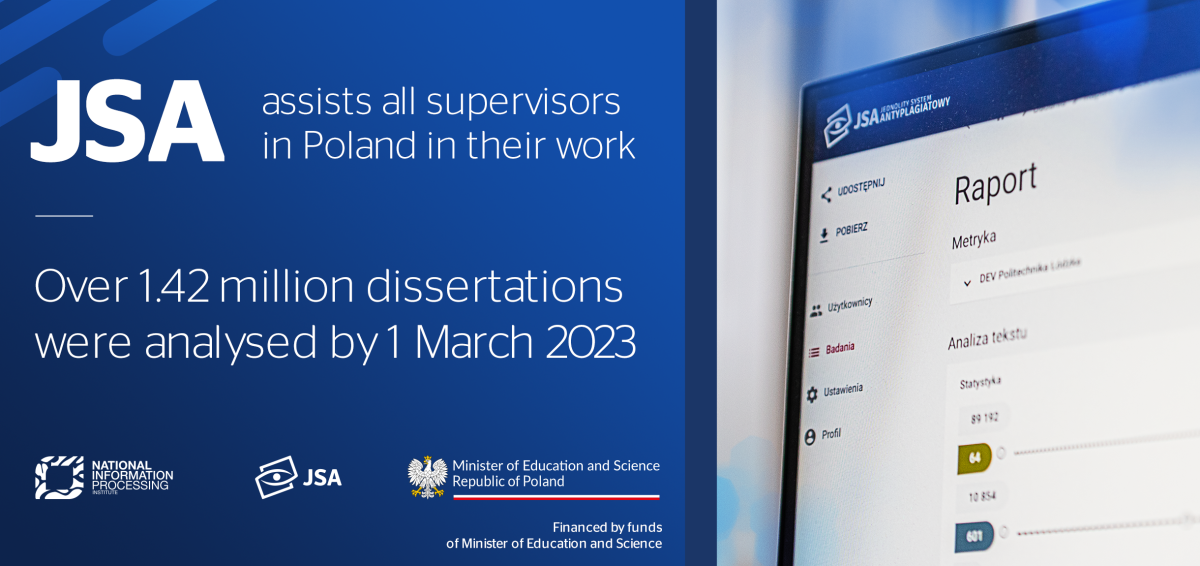In 2022, the Uniform Antiplagiarism System (JSA), which was developed by the National Information Processing Institute (OPI), was used to scan 323,966 dissertations. Only 1.7% of the dissertations exceeded the alarm threshold, which indicates that they share more than 70% similarity with other material. This represents a considerable decline since the launch of the system in 2019, when 2.5% of dissertations surpassed the threshold. Although dissertations may contain similar content to other works, this does not necessarily imply that they are plagiarised. All theses suspected of plagiarism are reviewed by supervisors who make the final decisions on whether their content is genuine. JSA is a tool that facilitates the comparison of dissertations with other published material, and assists supervisors in their work.
JSA scans all dissertations in Poland
JSA is a cutting-edge tool designed to meet the needs of Polish academic instructors and streamline the antiplagiarism market in Poland. ‘Before JSA, numerous programmes had been developed that relied on diverse algorithms and reference databases. Since the launch of JSA in 2019, all engineer’s, bachelor’s, master’s, and doctoral theses have been analysed using the same tool,’ says Dr Jarosław Protasiewicz, Head of OPI. ‘JSA is free of charge. The system is fully funded by the Polish Ministry of Education and Science. It is designed for supervisors at all higher education institutions and research institutes in Poland that are authorised to award professional titles and academic degrees. The introduction of JSA has simplified the process of comparing dissertation authenticity results between educational institutions in Poland,’.
JSA has proven to be a resounding success. In 2016, only 40% of dissertations underwent plagiarism scanning; since 2019, all theses in Poland have been scanned. The experts at OPI consistently enhance, modernise, and adapt the system to reflect the ever-changing legal regulations.
Over 1.42 million scanned dissertations
JSA is available to every institution in Poland that is authorised to grant professional titles and academic degrees. Between its launch in January 2019 and 1 March, 2023, JSA analysed 1.42 million dissertations.
‘In 2022, JSA provided invaluable assistance to supervisors in Poland by scanning a staggering 323,966 dissertations—112,954, bachelor’s theses, 57,192 engineer’s theses, 147,928 master’s theses, and 5,892 doctoral theses,’ says Dr Marek Kozłowski, Head of the Laboratory of Natural Language Processing at OPI. ‘On average, one supervisor scanned twelve dissertations. Since its launch, JSA has been used by 441 institutions and has gained over 100,000 users. The magnitude of the project is immense. OPI’s system offers genuine assistance to supervisors in Poland,’.
Over two billion documents in JSA reference databases
‘The reference databases that JSA relies on to analyse the content of scanned dissertations comprise over two billion documents. The system is supported by almost 80 TB of data. In 2022, the average time to analyse a single dissertation was 12.04 minutes,’ says Małgorzata Wartacz, Leader of the Analytics Team at OPI, which is responsible for JSA development. ‘We continuously enhance our system and actively seek feedback from the academic community. We are expanding our reference databases and we are committed to providing our tool to a global audience. Plagiarism can originate from a multitude of online sources, not only Polish-language ones. To ensure that dissertations are authentic, JSA also compares them against foreign-language sources. The entire process is easy and does not require any additional translation tools,’.
Four million dissertations in the Polish National Repository of Theses
To analyse dissertations, JSA uses a vast array of reference sources. Among them are the BING search engine, NEKST (a corpus of Polish-language internet resources that comprises over two billion websites), the ten most popular EU-language versions of Wikipedia, OpenAccess (a database of open access publications that contains over three million documents), databases of legal acts and rulings, and the academic promotion procedure database. One source that is particularly valuable is the Polish National Repository of Theses (ORPPD). JSA stands out as the sole antiplagiarism system that enjoys exclusive access to ORPPD’s data. ORPPD is maintained by OPI on behalf of the Polish Ministry of Education and Science. Created in November 2014, ORPPD serves as a comprehensive database of all dissertations defended in Poland after 30 September, 2009. Currently, ORPPD holds a collection of almost four million dissertations, and this number continues to increase.
